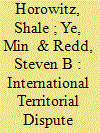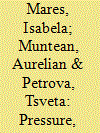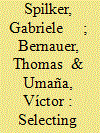|
|
|
Sort Order |
|
|
|
Items / Page
|
|
|
|
|
|
|
| Srl | Item |
| 1 |
ID:
174819


|
|
|
|
|
| Summary/Abstract |
Within international relations theory, there is significant disagreement on the nature and significance of leaders’ dispute outcome preferences. While many variants of realism assume that such preferences are relatively fixed and homogeneous, both the liberal and the constructivist schools view them as significant variables. This debate remains unresolved because, for the standard large-sample conflict data sets, there are no direct measures of leadership preferences over outcomes in given types of international disputes. Using a conflict bargaining experiment, we ask whether, after controlling for the effects of relative power and initial conditions, leadership preferences have a statistically significant impact. We use two different country samples—from China and the United States—to examine whether the impact of leadership preferences varies internationally. We find that realist-style preferences are a special rather than a general case, and that such differences have significant implications for understanding continuities and changes in Chinese and US foreign policies.
|
|
|
|
|
|
|
|
|
|
|
|
|
|
|
|
| 2 |
ID:
140353


|
|
|
|
|
| Summary/Abstract |
Status has long been implicated as a critical value of states and leaders in international politics. However, decades of research on the link between status and conflict have yielded divergent findings, and little evidence of a causal relationship. I attempt to resolve this impasse by shifting the focus from status to relative status concerns in building a theory of status from the ground up, beginning with its behavioral microfoundations. I build on and extend previous work through an experimental study of status threats and the escalation of commitment, operationalized here as a new behavioral escalation task using real financial incentives and framed around a narrative of war and peace. I utilize a unique sample of high-profile political and military leaders from the Senior Executive Fellow (SEF) program at the Harvard Kennedy School, as well as a group of demographically matched control subjects, allowing me to evaluate the moderating effect of power on status concerns while also addressing typical concerns about external validity in IR experiments. I find strong evidence that the fear of losing status impedes decision making and increases the tendency to “throw good money after bad,” but that power aids decision making by buffering high-power subjects against the worst effects of status loss.
|
|
|
|
|
|
|
|
|
|
|
|
|
|
|
|
| 3 |
ID:
090799


|
|
|
|
|
| Publication |
2009.
|
| Summary/Abstract |
We argue that large elections may exhibit a moral bias (i.e., conditional on the distribution of preferences within the electorate, alternatives understood by voters to be morally superior are more likely to win in large elections than in small ones).This bias can result from ethical expressive preferences, which include a payoff voters obtain from taking an action they believe to be ethical. In large elections, pivot probability is small, so expressive preferences become more important relative to material self-interest.
|
|
|
|
|
|
|
|
|
|
|
|
|
|
|
|
| 4 |
ID:
155307


|
|
|
|
|
| Summary/Abstract |
This article examines the mix of non-programmatic strategies used by politicians to gain voter support in contemporary Eastern Europe. We use a mixed-method design that combines survey-based experiments and qualitative research in a paired comparison of localities in Romania and Bulgaria. Our article documents that the mix of clientelistic strategies differs across localities with different turnover rates. In both Romania and Bulgaria, we find that the use of clientelistic strategies that politicise state resources is higher in localities with long-term political incumbents.
|
|
|
|
|
|
|
|
|
|
|
|
|
|
|
|
| 5 |
ID:
162213


|
|
|
|
|
| Summary/Abstract |
Do primary elections cause candidates to take extreme, polarized positions? Standard equilibrium analysis predicts full convergence to the median voter’s position with complete information, but behavioral game theory predicts divergence when players are policy-motivated and have out-of-equilibrium beliefs. Theoretically, I show that primary elections can cause greater extremism or moderation, depending on the beliefs candidates and voters have about their opponents. In a controlled incentivized experiment, I find that candidates diverge substantially and that primaries have little effect on average positions. Voters employ a strategy that weeds out candidates who are either too moderate or too extreme, which enhances ideological purity without increasing divergence. The analysis highlights the importance of behavioral assumptions in understanding the effects of electoral institutions.
|
|
|
|
|
|
|
|
|
|
|
|
|
|
|
|
| 6 |
ID:
153383


|
|
|
|
|
| Summary/Abstract |
Using two survey experiments run on college students and average Chinese citizens respectively, this article revisits the impact of political wariness on public opinion surveys in contemporary China. The authors randomly assigned some respondents to a control group, in which face-to-face surveys were administered following the standard procedure endorsed by China’s academic survey industry. Remaining respondents were randomly assigned to experimental groups, in which the otherwise identical surveys were presented as affiliated with the Chinese Communist Party (CCP). Neither college students nor average citizens in the experimental groups showed a significantly higher non-response rate or reported more politically correct answers when probed for their assessments of China’s democratic quality and their trust in China’s political system. On the contrary, responding to possible cues conveyed by the CCP emblem interviewers wore (i.e. one of the treatments), college students significantly lowered their assessments of China’s democratic quality and raised their perceived need for fundamental changes in China’s political system; similarly, average citizens significantly downgraded their overall trust in the CCP. This research did not detect any significant influence of political wariness in the surveys.
|
|
|
|
|
|
|
|
|
|
|
|
|
|
|
|
| 7 |
ID:
151279


|
|
|
|
|
| Summary/Abstract |
Preferential trade agreements (PTAs) constitute the most rapidly growing form of trade liberalization in the global economy. In contrast to, for example, the World Trade Organization, PTAs allow for discrimination among potential partner countries. This helps explain their proliferation. But it also raises an important question: which countries are preferred partners for PTAs? On the presumption that public opinion matters—both normatively and analytically—for trade policy, we study what types of countries citizens prefer for PTAs. We focus on developing countries, as they both play an increasingly important role in the expanding global network of PTAs and also remain understudied in the literature on international cooperation and trade policy. To account for the multidimensionality of PTA partner country choice, we develop and test a theoretical framework through conjoint experiments embedded in national surveys in Costa Rica, Nicaragua, and Vietnam. The results show that, despite starkly divergent national contexts, citizens in all three countries opt for similar partner countries. Respondents prefer culturally similar countries, democracies, and countries that maintain high environmental and labor standards. Somewhat surprisingly, economic size and geographic distance prove less important in the choice of which countries to support as PTA partners.
|
|
|
|
|
|
|
|
|
|
|
|
|
|
|
|
| 8 |
ID:
154904


|
|
|
|
|
| Summary/Abstract |
A large-scale randomized experiment conducted during the 2012 French presidential and parliamentary elections shows that voter registration requirements have significant effects on turnout, resulting in unequal participation. We assigned 20,500 apartments to one control or six treatment groups that received canvassing visits providing either information about registration or help to register at home. While both types of visits increased registration, home registration visits had a higher impact than information-only visits, indicating that both information costs and administrative barriers impede registration. Home registration did not reduce turnout among those who would have registered anyway. On the contrary, citizens registered due to the visits became more interested in and knowledgeable about the elections as a result of being able to participate in them, and 93% voted at least once in 2012. The results suggest that easing registration requirements could substantially enhance political participation and interest while improving representation of all groups.
|
|
|
|
|
|
|
|
|
|
|
|
|
|
|
|
|
|
|
|
|